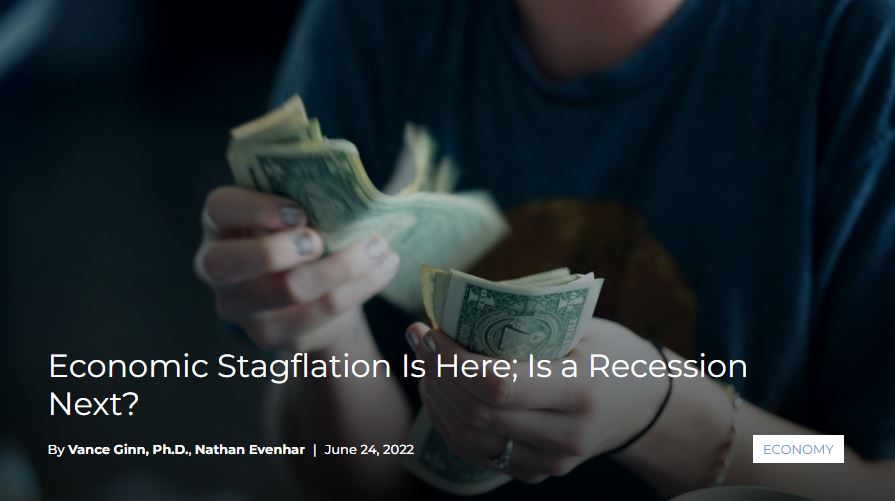|
“We’ve had two quarters: 1.5% decline in GDP, that’s actually done the first quarter, and this quarter now is estimated by the Atlanta Fed as being very, very close to zero,” economist Art Laffer told Fox Business. “If it comes in negative, that will be the two quarters in a row—that would be the definition of recession.”
With the economy stagnating and inflation soaring, stagflation is here for the first time since the Great Inflation of the 1970s because of bad policies out of Washington. A recession is inevitable as the government-inflated “boom” busts—and we could already be in one. But pro-growth policies would help ease the pain. The pandemic prompted irresponsible and record-breaking deficit spending by Congress, pumping in massive “stimulus” funds that raised the national debt by $6 trillion to $30 trillion, or about $90,000 owed by every American. And President Biden has also been on a regulatory spree. His administration has finalized 360 rules through June 17 with a cost of about $215 billion, according to the American Action Forum. Compared to the same time since its inauguration, the Trump administration completed 367 rules at an economic cost of $1.2 billion. Those bad policies by Congress and the Biden administration have been a major reason why the economy is stagnating, with negative growth in the first quarter of 2022 and likely little to no growth in the second quarter. And the Fed purchasing that debt and printing too much money to chase too few goods resulted in a 40-year high in inflation. This stagflation affects employers and workers. Firms now can hold less inventory for the same amount they paid previously, which reduces their profitability and causes them to increase prices, cut costs, or reduce output to keep up with inflation. And consumers have less purchasing power. Workers and employers must then reduce their spending and investment, respectively. With workers producing less, productivity declined by at the fastest rate since 1947, contributing to why inflation-adjusted average hourly earnings are down substantially over the last year. Another issue is that safety-net programs were increased without work requirements during and since the pandemic. Those programs included expanding Medicaid, increasing child tax credits, and enhancing unemployment insurance payments. This has created even more dependency on government. And these expansions of government contributed to soaring deficit-spending with a 25% increase in the national debt in just the last two years. These handouts also encouraged people not to work because they would lose more in payments than they would receive from working. There are now 5.5 million more unfilled jobs than unemployed workers. In order to reduce the pain of the inevitable recession, Congress ought to adopt pro-growth policies, similar to those between 2017-2019. These policies included a concerted effort to reduce onerous regulations and to pass the Tax Cuts and Jobs Act. They contributed to the U.S. records of the lowest poverty rate (across most demographics) and the highest inflation-adjusted median household income. But excessive spending was an important factor that was missed then because Congress spent too much. If Congress just reined in spending to no more than population growth plus inflation, as outlined in the Foundation’s Responsible American Budget (RAB), the $20 trillion increase in the national debt over the last 20 years would instead have been a nearly $3 trillion surplus. This would have meant more money in Americans’ pocket and more economic growth from lower interest rates and less debt for the Fed to purchase to create inflation. Which is why the Fed also needs a monetary rule, which would call for it to have a much smaller balance sheet to reduce the quantity of money and a much higher federal funds rate target. Historically, the federal funds rate target must be as high or higher than the rate of inflation. With the latest inflation rate being 8.6% and the federal funds rate target being in a range of only 1.5%-1.75%, the rate target should be much higher. While this would likely result in a quick and deep recession, this is necessary given the government-inflated boom that must now bust. Bad policies have driven this government failure that’s making the situation worse before it gets better. For the sake of Americans, let’s end them now, because more government isn’t the solution. https://www.texaspolicy.com/economic-stagflation-is-here-is-a-recession-next/ Comments are closed.
|
Vance Ginn, Ph.D.
|


 RSS Feed
RSS Feed